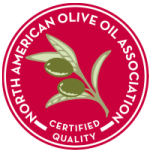Testing for olive oil quality
The NAOOA regularly collects, from the retail marketplace, random samples of olive oil which are tested to ensure compliance with standards set by the International Olive Council. Companies are notified of the results and if needed, the Food and Drug Administration is notified. [2]
In 2013, the NAOOA sued Kangadis Food for falsely labeling Capatriti brand oil as olive oil when the product was in fact pomace oil (oil made from pits and skins of olives). [3] The lawsuit resulted in a federal judge ordering Kangadis Foods to relabel or recall its product. [4]
Activities
The North American Olive Oil Association submitted a petition to the Food and Drug Administration for a qualified health claim for olive oil. The claim, that the monounsaturated fats in olive oil reduces the risk of coronary heart disease was approved by the FDA in 2004. [5]
The NAOOA has challenged claims by the University of California, Davis Olive Center that most supermarket olive oils are impostors. The organization has written that Olive Center has an interest in smearing the reputations of imported olive oil because their mission is “Enhancing the quality and economic viability of California table olives and olive oil.”. [6]
In 2014, the organization commissioned a study on National Attitudes and Usage of olive oil in the United States. The study found that only 25% of olive oil users in the USA "feel very or extremely knowledgeable about olive oil". [7]
The organization commissioned a report in 2015 that criticizes the standards set by the Olive Oil Commission of California. The report determined that in a random testing of California olive oils, 67% of the oils failed the California standards and 28% failed standards set by the International Olive Council. [8]
The NAOOA has been active in New York, Connecticut, Oregon and California's adoption of the international standards for olive oil grading and quality. [9]
This page is based on this
Wikipedia article Text is available under the
CC BY-SA 4.0 license; additional terms may apply.
Images, videos and audio are available under their respective licenses.
